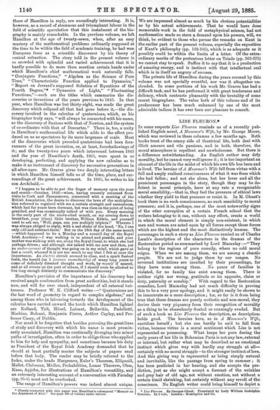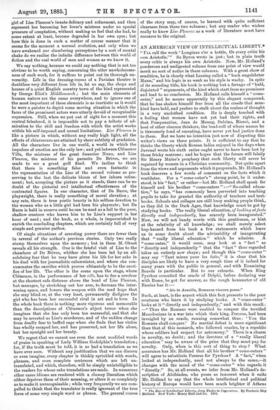LISE FLEURON.*
Ix some respects Liss Fleuron reminds us of a recently pub- lished English novel, A Mummer's Wife, by Mr. George Moore, which was reviewed in these columns a few months ago. Both books treat of the seamy side of theatrical life, both deal with illicit amours and vile passions, and in both, therefore, the moral atmosphere is repellent and unwholesome. But there is a difference notwithstanding. An English author may defy morality, but he cannot very well ignore it ; it is too important an element of the life in the midst of which his own life has been and is lived. The heroine of A Mummer's Wife fell from virtue with a full and amply realised consciousness of what it was from which she had fallen ; and not she alone, but her lover and all the prominent personages in the story, though they may he de- ficient in moral principle, have at any rate a recognisable moral sensibility,—that is, they feel the pressure of ethical laws whether they yield to that pressure or resist it. In M. Ohnet's book there is no such consciousness, no such sensibility to moral pressure; and it is, perhaps, one of the most noteworthy signs of the utter corruption of a certain French school that the writers belonging to it can, without any effort, create a world in which the moral element is simply non-existent, in which men and women are acted upon by all forces except those forces which are the highest and the most distinctively human. The personages in such a story as Lise neuron remind us of Charles Lamb's description of the characters in the dramas of the Restoration period as summarised by Lord Macaulay :—" They belong to the regions of pure comedy, where no cold moral reigns. When we are among them, we are among a chaotic people. We are not to judge them by our usages. No reverend institutions are insulted by their proceedings, for they have none among them. No peace of families is violated, for no family ties exist among them. There is neither right nor wrong, gratitude or its opposite, claim or duty, paternity or sonship." With regard to the Restoration comedies, Lord Macaulay had not much difficulty in proving this to be a very poor apology, and it might easily be shown to be inaccurate as a mere description ; for, so far is it from being tree that these dramas are purely aesthetic and non-moral, they derive their very piquancy from their recognition of morality as a thing to be shamelessly flouted or cunningly evaded. But of such a book as Liss Fleuron the description, as descriptions holds good. The heroine here, as in A Mummer's Wife, sacrifices herself ; but she can hardly be said to fall from virtue, because virtue is a moral sentiment which Lise is not represented as possessing. What keeps her pure during the early years of her life in Bohemian Paris is not any law, external or internal, but rather what may be described as an emotional instinct which gives way with hardly any struggle at all— certainly with no moral struggle—to the stronger instinct of love. And this giving way is represented as being simply natural and inevitable, like the passage from spring to summer ; it has been predicted in her hearing, and she accepts the pre- diction, just as she might accept a forecast of the wrinkles and grey hair of old age, not without emotion, not without a certain timid shrinking, but certainly without any revolt of the conscience. No English writer could bring himself to depict a * Lise Fleures. By Georges Ohuet. Translated by Lady William Godolphin Osborne. In 2 vols. London : Remington and Co.
girl of Lisa Flenron's innate delicacy and refinement, and then represent her becoming her lover's mistress under no special pressure of temptation, without making us feel that she had, to some extent at least, become degraded in her own eyes; but here this is done in such a matter of course manner that it seems for the moment a normal evolution, and only when we have awakened our slumbering perceptions by a sort of mental shake do we realise the infinite difference between this world of fiction and the real world of men and women as we know it.
We say nothing, because we could say nothing that is not too obvious to be worth saying, concerning the utter unwholesome- ness of such work, for it suffices to point out its thorough un- veracity. Life in the dressing-rooms of a Parisian theatre is doubtless very different from life in, let us say, the shops and houses of a quiet English country town of the kind represented by George Eliot's Middlemarch ; but the main elements of human nature are the same everywhere, and to ignore one of the most important of these elements is as inartistic as it would be were a painter to depict some moving situation in which the faces of the prominent actors were utterly devoid of recognisable expression. Still, when we put out of sight for a moment this central falsehood, it is impossible not to pay a tribute of ad- miration to the skill and freedom with which the artist works within his self-imposed and unreal limitations. Lisa Fleuron is like a picture in which, without any really high light, all the effects of chiaroscuro are attained by sheer subtlety of gradation. All the characters live in one world, a world in which the impulses of emotion are the only law ; and yet between 014mence Villa, the mistress of the great financier Nano, and Lise Fleuron, the mistress of his parasite De Brives, we are made to see a great gulf fixed. We incline to think that there is something false and even fantastic in the representation of the Lise of the second volume as pre- serving to the last the delicate bloom of her inborn refine- ment; but, accepting the picture as it stands, there can be no -doubt of the pictorial and intellectual effectiveness of the contrasted figures. In one character, that of De Barre, the playwright, there is really something of moral elevation ; at any rate, there is true poetic beauty in his selfless devotion to the woman who as a little girl had been his playmate; but De Barre is held in reserve until he can be used as a foil to the poor, shallow creature who leaves him to be Lise's support in her hour of need ; and the book, as a whole, is impoverished to enrich the concluding chapters, which are certainly full of very simple and genuine pathos.
Of single situations of arresting power there are fewer than in several of the author's previous stories. Only two really stamp themselves upon the memory ; but in them M. Ohnet -reveals all his strength. One is the fateful visit of Lise to the chambers of De Brives, whither she has been led by an all- subduing fear that he may have given his life for her sake in his duel with her journalistic calumniator, and where she con- summates the sacrifice which proves ultimately to be the sacri- fice of her life. The other is the scene upon the stage, where Cldmence, in the performance of her role, has to fire a revolver at the shortest safe distance above the head of Lise Fleuron, 'but manages, by stretching out her arm, to decrease the inter- vening space, and lowers the weapon with the mad hope that she may blind or, at the very least, permanently disfigure the girl who has been her successful rival in art and in love. In the whole book there is nothing more vigorous and memorable than the descriptions of Clemence's abject terror when she imagines that she has only been too successful, and that she may be arrested as Lisa's murderess, and of the sudden change from deadly fear to baffled rage when she finds that her victim has wholly escaped her, and has preserved, not her life alone, but her eyesight and her beauty.
We regret that we cannot use even the most modified words of praise in speaking of Lady William Godolphin's translation ; for, if the truth must be told, it is as bad a translation as we have ever seen. Without any justification that we can discern .4:)r even imagine, every chapter is thickly sprinkled with words, phrases, and even complete sentences which are left un- translated, and which, therefore, will be simply unintelligible to the readers for whose sake translations are made. In numerous other cases idioms are rendered with a clumsy literalism which either deprives them of their meaning, or alters it so completely as to make it unrecognisable ; while very frequently we are com- pelled to think that the translator is really ignorant of the true of the story may, of course, be learned with quite sufficient clearness from these two volumes ; but any reader who wishes really to know Lise Fleurou as a work of literature must have recourse to the original.



































 Previous page
Previous page